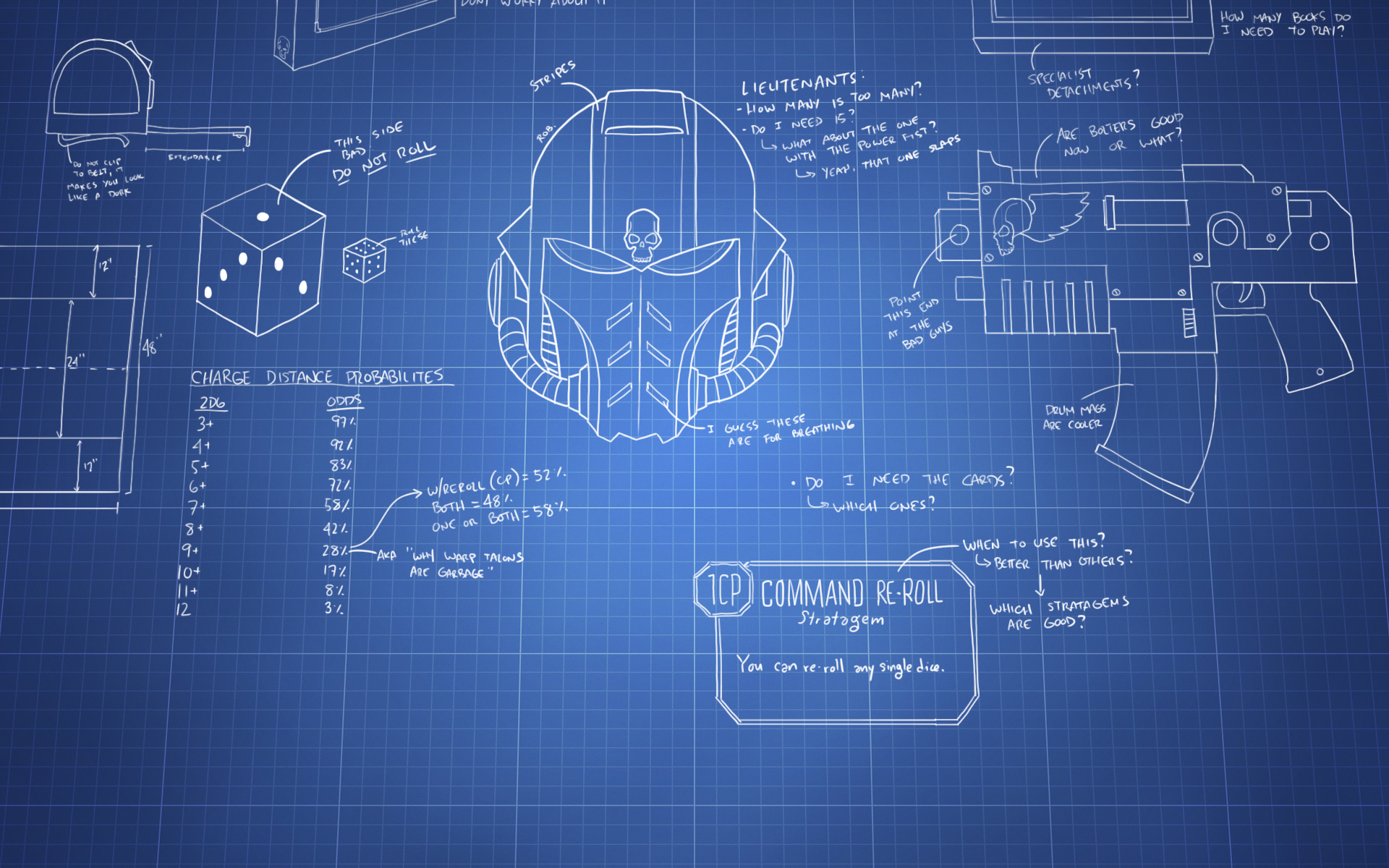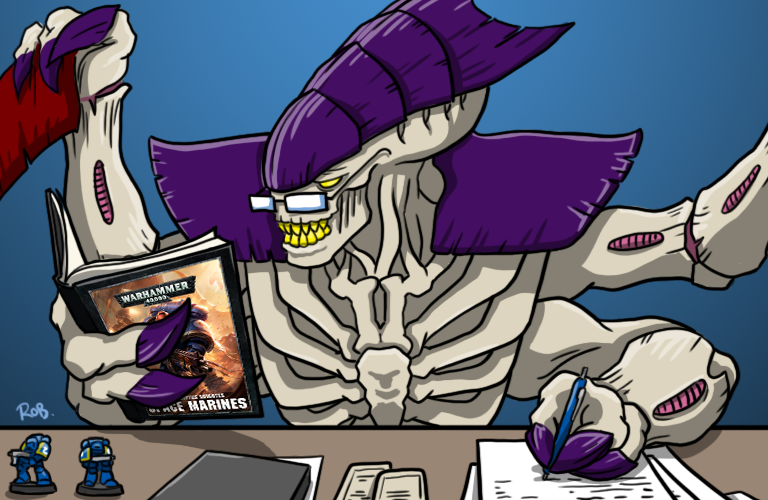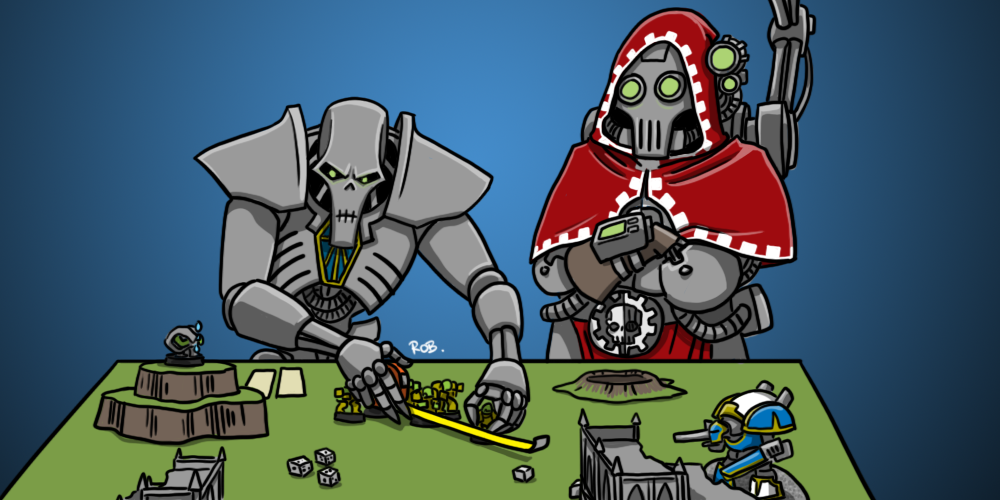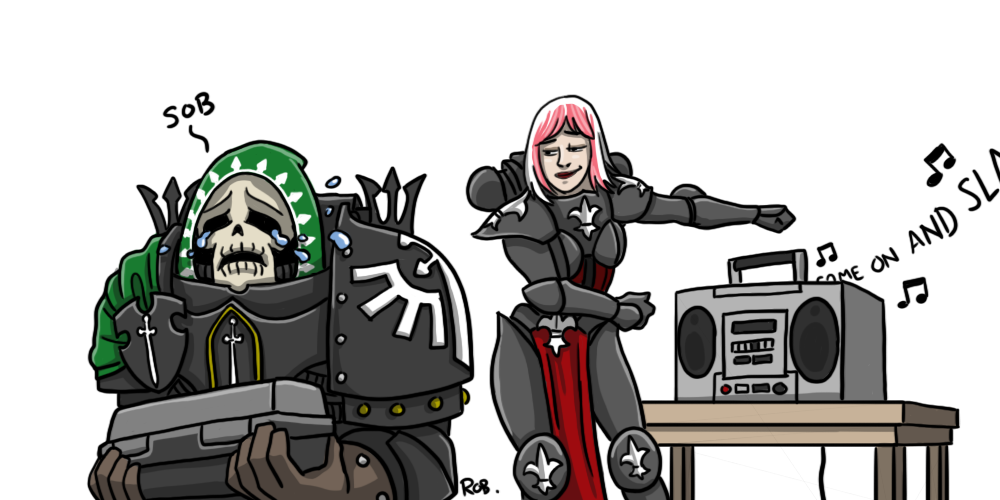Most of what we’ve talked about so far in our Getting Started series is advice on how to actually play the game, but there’s another aspect to wargaming that is just as, if not more, important: how to interact with other players. Playing 40k, AoS, or any other wargame, is as much a social experience as it is a game, and many of us here at Goonhammer have made lifelong friends through this hobby. While most of the advice we could give you would apply to any social situation – be cool, keep up with basic hygiene, don’t be a dick – there are some points of etiquette specific to wargaming that might not be immediately obvious to someone new to the scene.
There’s no need to worry! As ever, we’re here to help you navigate this hobby, this time with a list of some habits that will help you be a good opponent others will enjoy playing against, even as you’re working on becoming a better player. With time, effort, and a little luck, you’ll be able to become the sort of player who everyone enjoys playing against, regardless of whether they win or lose.
1. Talk to your opponent before you play
You’ve probably heard the horror stories by now – a relatively new player shows up expecting a fun game where they can show off their newest unit and get a little practice in, only to wind up finding themselves across the table from a monstrously strong list that completely eliminates their army by turn 2. This sort of mismatch results in disappointment all around – it’s painful for the player who brought the softer list, and the player with the more competitive list doesn’t get the thrill of a close game.
The problem here is a lack of communication. Different players have different preferred ways to play the game, and the rules are set up to allow you to build the game you want to play. However, if you don’t let your opponent know what sort of game you’re looking for before you play, there’s a good chance the two of you could wind up aiming for totally mismatched experiences.
Fortunately, the solution here is easy; all you have to do is talk to your opponent. Let them know if you’re new to the game, if you’re trying something new, or if you just want to do something a little less high-stakes. On the flip side, if you’re looking to fight a tightly written rock-solid tournament list, discussing this with your opponent beforehand will both let them know to bring their best and make sure they’re not expecting a fluffy narrative romp.
Sometimes, another player might decide they don’t want a game with you after you’ve told them what you’re looking for. If this happens, don’t feel bad: they’re just not looking for the same sort of game that you are right now, and that’s OK. Better to find that out on the front end than wind up three turns in praying for the torture to just end already.
If you find that it’s difficult for you to get pick-up games, ask around. Lots of shops and clubs have social media pages that you can use to organize games and find players who want to play the same sort of game you do, and many will have specific times during the week when table space is mostly (or entirely) given over to 40k players. Take advantage of these opportunities to plan for the games you want to play.
2. Respect the effort your opponent put into their army
Remember all that time and effort you put in agonizing over making sure your Space Wolves were the perfect mix of super-Viking and taxidermy-aficionado before you brought them out to the shop to play? Well, that other player with the incredible Primarch conversion or the amazing paint-job on their Knight went through that exact same process. Most players don’t mind if you want to get a closer look at the conversion or paintjob they spent time on – after all, the whole point of putting in that time is so that they could show it off to people like you – but before you go in to get that closer look, give them the same courtesy you’d expect and ask if it’s alright, and be very careful when you look.
This rule holds true during gameplay – generally speaking, each player will remove their own casualties from the board, and you shouldn’t remove your opponent’s unless specifically asked to. If your opponent’s minis are in your way for whatever reason (sometimes spindly bits get tangled up in each other or make it impossible to move one mini without touching another), just point that out and ask your opponent how they’d like to handle it.
3. Print your army list
You put a lot of time into putting your army list together, but that list isn’t doing anyone any good if you leave it at home. Print it out and bring it with you to your game. Better yet, bring two copies: one for you, and one for your opponent.
The point here isn’t to prove that you’re not cheating. It’s to help you and your opponent remember what’s there on the table. Whenever your opponent is wondering which relic is on the Warlock and which is on the Farseer, they won’t have to ask – they’ll be able to just look at the list. It will also help you if you need to look up a special rule for a unit or a piece of wargear by making it that much easier to know exactly what you’re looking for. Having your list printed will help both players make more informed decisions, which will both save time and make the game more fun for everyone. If you’re in a format like an ITC event where these things aren’t fixed and you might choose game to game, it’s worth having “default” options written on your list just in case you forget to declare them beforehand – that way there’s no bad feeling if you get to a critical moment where having that piece of gear is essential to your plan.
Keep in mind that Battlescribe list outputs aren’t always the best formatted – depending on which army you’re playing, you may need to do some work to make the list easier to read. Goonhammer maintains a useful tool for this in Buttscribe, which will take roster output from the popular Battlescribe tool and turn it into easy-to-read unit cards that have some space for wound-tracking and other notes you need to take. However, even if you do print out these cards, you should still bring a copy of your list in a more traditional format.
4. Keep it moving
A 2000-point game of 40k can be a lengthy affair – expect to be playing for at least a couple of hours in an average pickup game. With that level of time investment already baked in, a game that runs significantly longer than expected can be a real problem. We’ve all got lives outside of 40k, and it’s important to be respectful of that.
This isn’t to say that you have to move as fast as a veteran player would (especially if you’re a newer player), but everything you can do to speed things up will be greatly appreciated. Do what you can to keep things moving, and don’t waste your opponent’s time at the table. Here are a few things you can do to keep the game moving along:
- Know your rules. Take the time to read all the rules relevant to your faction and make sure that even if you don’t know the rules, you know where to find them. Put tabs on important pages in your rulebook and codex so you can quickly refer to those rules. Buy or create cards or sheets that tell you what your psychic powers and weapons do. Time spent shuffling through rules is time that could be spent moving minis, rolling dice, and enjoying the results. Do as much prep before hand so you can get right to the action.
- Pay attention during your opponent’s turn. At first glance, the “I go, you go” gameplay of 40k means there is significant downtime between your turns. However, the fact that you’re not currently moving your army or rolling dice doesn’t mean you should check out. Pay attention to your opponent’s moves and use their turn to plan out what you’re going to do when it gets back to you. Paying attention during your opponent’s turn will make your turns go faster and will cut down on real dead time where nothing is going on. If you only start thinking about your plan for next turn when your own Movement phase starts, you’re going to drag those games out a lot more than if you already have a clear idea.
- Be consistent in how you roll. Find a good spot to roll your dice where both you and your opponent can see the results, and use it consistently. Dice trays are excellent, as they provide a contained area to roll the dice with a flat bottom, meaning that you’re less likely to lose dice in terrain, hit models with them, or wind up with a “cocked” die where it’s unclear what the result is. Plus, if you need to move it for whatever reason, you can pick up the tray without disturbing the results of the dice. Also think about the dice you’re using – are they easy to read? Or are they likely to result in confusion? Using dice that are easy for both you and your opponent to read will speed up the process of resolving rolls and cut down on situations where you might disagree on the outcome.
- Agree on what result you need before rolling. Sometimes, the outcome of a roll will depend on something else – how many inches does my assault unit need to roll in order to make its charge? How do the various hit buffs and debuffs in play affect this shot against that Alaitoc Crimson Hunter?* Is the unit of Kabalites you’re shooting at in cover? In these situations, tell your opponent what you think the result you need is before you roll. If you’re not sure, figure it out: measure the distance, ask what buffs or debuffs your opponent has applied, or get down next to the table and look to see whether they’re in cover against that shot. Once you roll, both you and your opponent will likely be all the more tempted to try to fudge the numbers in your favor, and agreeing on the front end will avoid those situations and let you move on to the next thing on your agenda immediately after you roll. Equally, giving your opponent a second to see the result of the roll and calling out the numbers as you go – “12 shots, 8 hits, 4 wounds” etc. – lets them a) stay involved and b) avoids possible disputes down the line where they suddenly decide they have no idea how you rolled that fistful of wounds on their guys.
5. Learn how to resolve rules disputes fairly and quickly
Most heated and unpleasant moments in 40k have the same source: rules disagreements. When you and your opponent disagree over the rules, it’s easy to lose sight of the fact that you’re playing a game that’s supposed to be fun for everyone – after all, winning is more fun than losing, and losing to a technicality is no fun at all.
When you find yourself in this situation – and you will – take a moment and step back. Explain why you think the rule means what you think it does, and listen carefully to your opponent’s reasoning. One of you might wind up convincing the other, and you can skip the rest of this section and get back to the game. If not, here are a few suggestions to help resolve your dispute:
- Read the rule again. Be honest with yourself: did you read it right the first time? If not, hey, problem solved! It sounds silly, but everyone makes honest mistakes. If you find that you have, there’s no shame in that. Take the opportunity to improve your play and be a better opponent for the next game. The majority of people are willing to forgive you misunderstanding something, especially if you’re new, as long as you’re pleasant about it and open to being wrong.
- Ask for help. Especially if you’re playing at your FLGS, there’s a decent chance there’s someone there who has more experience than both you and your opponent combined. Ask them. Ask the shopkeeper. Ask a judge or TO if you’re at a tournament. Ask the internet – as we explained in our previous post, GW maintains a list of Frequently Asked Questions and rules errata that clear up a lot of common rules problems. These are all resources at your disposal, and you should feel free to make use of them.
- If all else fails, flip a coin and move on. This may sound silly, but if both you and your opponent are certain you’re correct and you can’t find a definitive ruling, leave it to chance and move on. The longer you spend arguing, the harder it will be for either of you to let go, and the less fun the rest of the game will be. Accept the results, play it the same way for the rest of the game, and try to salvage what fun you can afterwards. Just remember not to rub it in your opponent’s face too hard when you find out later that you were right all along.
6. Learn to take bad rolls in stride
You’re going to roll a lot of dice in your 40k career, and as anyone who’s played more than a handful of games will tell you, sometimes they’re just not going to go your way. Everyone has a game where they just can’t hit the broad side of a bunker to save their life, and while it definitely sucks to lose a game when it feels like there’s nothing more you could have done, it’s going to happen, and you need to be prepared for it. When it happens, take your lumps, accept the outcome, and move on. 40k is a game of applied statistics, and over the course of several games, you’re likely to perform at a level that reflects both your list composition and your level of play, which is a fancy way of saying that the next game almost certainly won’t be as bad. If you feel like you’re consistently losing due to bad luck with the dice and that’s impacting the amount of fun you have with the game, try seeing if you can make some changes to your list to beef it up or even just fit your play-style better. Do something positive with that feeling – blaming the dice won’t do anything except make your opponent feel bad for beating you.
Speaking of which:
7. Be a good ham, no matter the outcome
40k is an inherently competitive game. Make no mistake: the object of putting your models on the board and rolling dice to represent their weapons is to remove enough of the other player’s models from the board to allow you to seize victory. You might have other goals at the same time, such as forging a compelling narrative, trying out a new list, or just having a good time with some friends, but at the end of the day you’re playing a game that has clearly-defined win/loss conditions and are at least notionally trying to succeed and force your opponent to fail. And while it’s important to be honest about this, it’s absolutely crucial to recognize that the other player is doing the exact same thing.
Back in 2017, the developers of the popular PC game Overwatch removed the “Rate This Match” feature that had been in the game for some time. When asked why, Jeff Kaplan, Overwatch’s Game Director explained:
We had high hopes for this feature but after a year of the game being live and an extended period in beta, all we learned from the feature was:
- New players used the Rate This Match feature more than existing players
- Players enjoy winning
- Players do not enjoy losing
This holds true in any competitive game, including 40k: winning is a lot of fun, losing often less so. While you’re standing there basking in the thrill of having pulled out a win over your opponent, they’re likely racking their brain trying to figure out where it all went wrong. Don’t hold it over them. Shake hands, let them know you enjoyed the game, and enjoy your win on your own time.
Equally important is not to make your opponent feel bad if they win. They know that winning is more fun than losing – if they didn’t, why did they bother winning? – and there’s no need for you to point out that you’re not happy that you lost. Don’t accuse the other player of being “cheap” or trying to “win at all costs,” and definitely don’t call them a cheater (unless they really were, and even then only if you’re absolutely sure). Don’t try to guilt them or otherwise do anything that would take away from their moment of glory after winning; after all, you wouldn’t want them to do that to you.
Instead, take the opportunity to be more positive. One player I’ve played against has a self-imposed rule – in every game he loses at his local shop, he asks the winning player to to help him identify one or two things he can work to improve on. Sometimes, the other player refuses, but more often than not they point out something he could have done to play better. This lets him convert a moment that initially doesn’t feel great into an opportunity for growth, and gives his opponent the opportunity to feel even better by handing out some advice to another player. There won’t always be time for this (especially at a tournament), but take some time to think about how you can transform your losses into a positive experience for everyone involved.
Whether you win or lose, treat every game as though you might wind up playing against that player again someday. Think about how the way you react to the outcome might impact whether they want to play another game with you (or at all). The last thing you want to happen is to lose a potential opponent in the future just because you couldn’t help but play “Space Jam” after a big win.
As I said earlier, this hobby is inherently social. While playing a game of 40k against yourself is certainly possible, it’s not nearly as fun as taking your army out on patrol and testing its might and your mettle against others. By doing your part to make every game you play fun for everyone involved, you’re contributing to the wargaming and hobby community at large by helping share the games we love so much with as many people as possible, and you’re sure to make some great friends along the way.
*All of them. The answer is “all of them.” Good luck.





